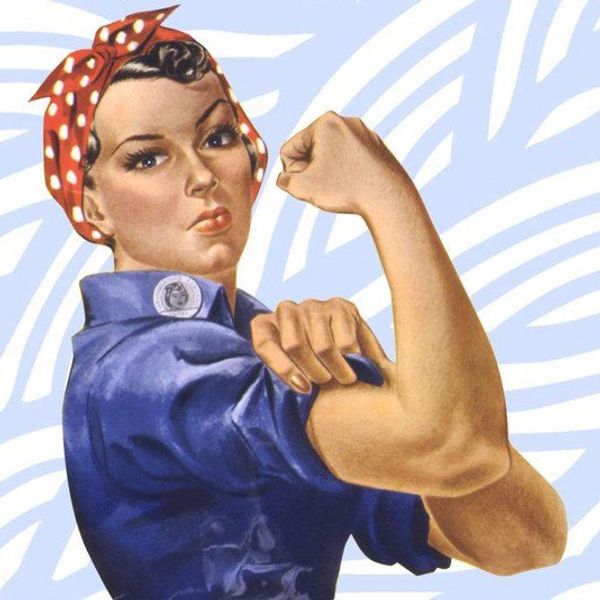One of the most talked about and most misunderstood terms is “feminism." On one end of the spectrum you have the people who despise feminism and feminists. These individuals will call them "femi-nazi's," say that they are ugly and can't get laid, or invoke the famous Pat Robertson line, "Feminism is a socialist, anti-family, political movement that encourages women to leave their husbands, kill their children, practice witchcraft, destroy capitalism and become lesbians." Yikes, no wonder feminism has a bad rap! But on the other hand of the spectrum are the group of people who argue for feminism without understanding feminist politics. To most people, feminism is about equality. In her book, "Feminism is for everybody," bell Hooks talks about how that definition of feminism reinforces the myth that feminism is anti-male, and also doesn't serve the purpose of explaining the larger social issues that face women. Instead, Hooks offers up her own definition: “Feminism is a movement to end sexism, sexist exploitation, and oppression.” But first, before we talk about feminism, we must first talk about sexism.
The best way to discuss sexism is through the concept of institutionalized sexism, which is usually referred to as "patriarchy." bell Hooks defines this in her novel The Will to Change as “a political-social system that insists that males are inherently dominating, superior to everything and everyone deemed weak, especially females, and endowed with the right to dominate and rule over the weak to maintain that dominance through various forms of psychological terrorism and violence.” The crucial aspect of this analysis is in the concept that males are inherently dominating and superior, and that they must maintain this dominance through violence.
So in other words, every man should be like the Incredible Hulk.
But men are superior! Women are weak! Says all the MRA's or men's rights activists. Actually, no, men and women are fundamentally the same, with only a couple of variations. Part of why this discrepancy still occurs is because most people aren't taught the difference between sex and gender. When we describe men and women, it is important not to conflate sex and gender. Sex, in terms of biology, is determined by anatomy, chromosomes, and hormones. Gender, according to the World Health Organization, refers to the socially constructed characteristics of women and men – such as the norms, roles and relationships that exist between them. While science continually makes contributions to the discussion of whether or not male and female brains are different, most agree that these differences do not mean that one sex is smarter than the other.
Unless we're talking about driving and getting directions.
Within these gender roles, men are typically identified as being "masculine," meaning that they are
As Hillary proves, war mongering and being on the payroll of big corporations aren't just a MAN's game! Move over, boys!
The consequences for these stereotypes are vast and numerous. While women make up half of the population, they represent just 4.6% of CEO positions at S&P 500 companies. In Congress, the numbers are at equally abysmal rates, with women in the U.S Senate numbering 20 out of 100, and in the House 81 out of 435. While these numbers are typically thrown out to discuss how women are unequal to men, it is less obvious how this happens through the context of sexism. One of the fundamental pillars of sexism is its ability to give men a political, economic and social privilege, called "male privilege," in society. Male privilege is a term that describes the way that men get special privileges in society that aren't given to women.
We've already gone over how the central basis of patriarchy is the notion that women are inferior while men are superior--the extended logic of this conclusion is that in a fictional world where a man is rational, and a woman's rationale are examined, it is most likely that the male's rationale or even just his opinion would be preferred over the woman's. This has been proven countless times through studies that look at how our unconscious biases affect the world around us. The New York Times ran a piece that talked about "a huge interactive exploration of 14 million reviews on RateMyProfessors.com that recently suggested that male professors are disproportionately likely to be described as a “star” or “genius.” Female professors are disproportionately described as “nasty,” “ugly,” “bossy” or “disorganized.”" These types of studies show that we adopt the norms and behaviors of gender roles as truth, which in affect, give privilege of authority to men.
Talking about male privilege is in no way meant to imply that men are all evil, or that they consciously dominate women in their everyday lives. Rather, sexism can be enforced by both men and women who have each grown up listening to the script that patriarchy has dictated how men and women are to act and be viewed. Patriarchy disproportionately hurts women, but it can also hurt men in a multitude of ways. bell Hooks talks about how women are not born into feminist politics; rather it is a conscious choice that begins with understanding and unlearning sexist thinking. Gender justice will only be accomplished when we all learn what this means.
























